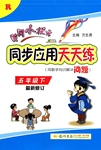题目内容
They eat only plant foods, and take care to ________ animal products from other areas of their lives.
A. contain B. maintain
C. exclude D. Include
练习册系列答案
 黄冈小状元同步计算天天练系列答案
黄冈小状元同步计算天天练系列答案
相关题目
题目内容
They eat only plant foods, and take care to ________ animal products from other areas of their lives.
A. contain B. maintain
C. exclude D. Include
 黄冈小状元同步计算天天练系列答案
黄冈小状元同步计算天天练系列答案